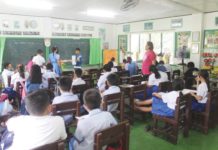ILOILO City – Western Visayas has recorded a significant breakthrough in early-grade reading, with the number of struggling readers among Grades 1 to 3 dropping from nearly 29 percent at the start of the school year to just 7.17 percent by March, according to the Department of Education (DepEd).
Based on the Comprehensive Rapid Literacy Assessment (CRLA) for school year 2024–2025, the decline reflects the impact of DepEd Region’s Literacy Remediation Program (LRP), which was rolled out across eight school divisions in Aklan, Antique, Capiz, Guimaras, Iloilo Province, Iloilo City, Passi City, and Roxas City.
From 2,617 learners initially classified as low-emerging readers, the number was reduced to only 106 after four weeks of intensive interventions. Many of the students advanced to higher classifications, including high-emerging, developing, and transitioning readers.
In an interview with Panay News, DepEd-6 information officer Hernani Escullar Jr. stressed the importance of mastering literacy skills in the early years.
“DepEd Region 6 implemented the National Literacy Remediation Program to provide intensive and structured literacy intervention to Grade 3 learners classified as Low Emerging Readers in English based on the End of School Year (EoSY) 2024-2025 Comprehensive Rapid Literacy Assessment (CRLA). The Program shall equip the learners with foundational literacy skills necessary to successfully transition to Grade 4, where English is used as the primary medium of instruction,” he said.
Escullar added that the push is part of DepEd’s back-to-basics directive.
“DepEd Region 6, through the mandate of our OIC Regional Director Cristito Eco, will get back to the ‘basics’. Ensuring that literacy and comprehension of learners in Key Stage 1 is given appropriate attention and also to provide necessary interventions to those who need it. We will make sure that these learners know how to read and comprehend, so it will be easy for them to progress to the next key stages in basic education,” he said.
The interventions included letter sound recognition, decoding and blending, word reading, vocabulary development, and basic comprehension strategies.
Escullar noted that such support is vital as Grade 4 introduces more advanced subjects requiring stronger reading proficiency.
During the four-week Literacy Rescue Program (LRP), teachers provided intensive coaching to ensure struggling learners gained the skills needed to read. The 106 students who remain low-emerging readers will continue receiving individualized interventions to address their specific learning gaps.
Classification of Readers
* Emerging Readers – This group includes both Low and High Emerging Readers. They are just beginning to develop foundational literacy skills like letter recognition and phonological awareness.
* Transitioning Readers – These readers are making progress towards reading at grade level. They can typically decode some words, understand basic sentence structure, and answer some comprehension questions, but they still need support to become fully proficient.
* Readers at Grade Level – These students demonstrate strong reading skills, including fluency, decoding, and comprehension, and can read materials at their grade level independently.
Interventions for children struggling with reading include letter sound recognition, decoding and blending, word reading, vocabulary development, and basic reading comprehension strategies./PN




